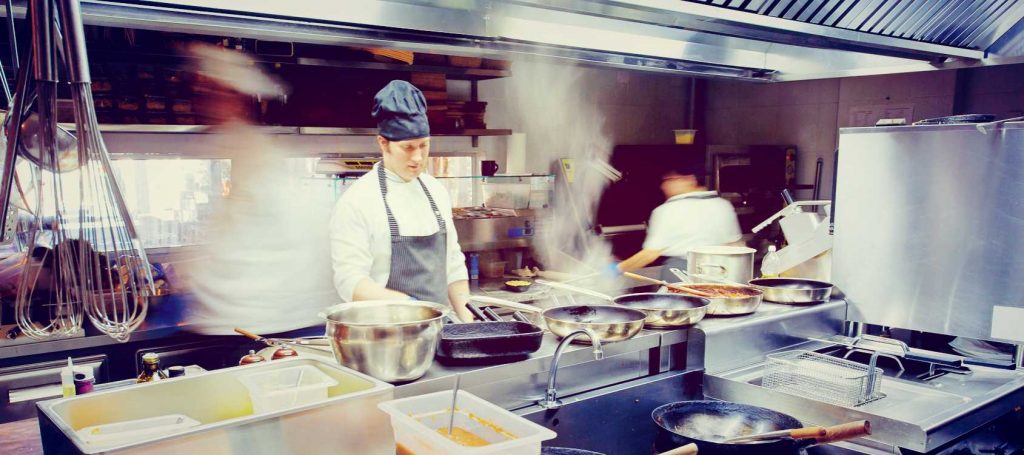Protect Your Restaurant Floor Drain From Food Debris
Maintaining a commercial kitchen requires a lot attention. You need to keep the grill running, the food safety standards high, the food cooking, and the restaurant floor drain working.
If you've ever had to deal with a clogged commercial floor drain in the middle of a busy dinner rush, you know why we rank it so high on the list of potential kitchen disasters.
Here are a few essential tips for cleaning and maintaining your commercial floor drain so that you don't ever have to face disaster again.
What's the Big Deal?
When your restaurant floor drain backs up you pray it's just water coming back up that's easily taken care of with the mop bucket. Because if it's anything else, the consequences are much more severe.
A flooded floor in the kitchen or dishroom means slowing service to get someone who's inevitably in the way to clean it up. People slip, feet get wet, and everyone gets a little more irritable for the remainder of their shift.
Most restaurant floors drain issues are manageable. Clean out the floor drain blockage and you're usually fine. It's when things start coming back up through the drain that it's an issue. Grease trap backups are one of the worst things you can imagine. Even just the fumes can ruin the night.
The "things" that can come back from floor drains are nasty, unsanitary, and can they can smell so bad that they'll ruin your entire night and possibly your reputation as they can empty the restaurant from the smell.
That's the worst case scenario you're trying to avoid. And you can, with these essential tips for keeping your restaurant floor drain clean.
Get the Grease Trap Cleaned Early and Often
The grease trap might be the most crucial aspect of any drain system, and possibly any restaurant kitchen. The amount of grease that can seep into your floor drain would astound anyone who's never had the pleasure of cleaning a grease trap.
It's an inevitable part of kitchen life. Cooking creates grease and it needs somewhere to go. When you clean the floors, the grease goes into the trap and stays there, so it doesn't clog up the drains.
You know the smell. That stomach-turning smell that tells you the grease trap needs to get changed. And that's the first step in maintaining your floors drain. Monitor that grease trap. Get it professionally emptied early and often.
Sweep up Chunks of Food
Next up is something that comes down to sheer laziness, which at the end of a long night, understandably happens. Food and other scraps fall on the ground during service and doesn't get swept until later.
The problem being, sometimes those scraps find their way from under counters and fryers and into the drain. Larger pieces will clog drains quicker while smaller pieces still clog drains over time.
Things on the floor find their way down the floor drain. That'll happen even with diligent sweeping. But the more you can keep out of the drain the longer you'll avoid disaster.
If something does fall down the drain, remove the grate and see if you can remove is right then.
Drains Are for Cleaning Not Dumping
Floor drains are for minor spills and squeegeeing water after you've cleaned and de-greased the floor. They handle those things well, but not so much anything beyond them.
Employees should not think of the floor drain as an easy to way to dump water. They're not for emptying the entire mop bucket, and certainly not for indiscriminate dumping.
If you're dealing with a clog, sometimes a small amount of hot water can helps loosen things up. However, keep it to a small amount. Nothing more than a plastic cup or maybe two for severe clogs.
The reason being that larger clogs can stop water from draining all together and pouring more down the drain just increases the chances of an overflow.
Keep a Drain Snake Handy
When the floor drain's clogged, and you can't call a professional, it's important to have a drain snake handy. These wire-like devices wrap on a spool with a handle to spin them down your drain.
They break up some pretty tough clogs and actually make pretty good maintenance tools. Feel free to snake the drain every week to prevent clogs before they can form.
Though do know that if you're having problems with the same clog over and over a drain snake is probably only a temporary fix. You'll need to call in the professionals to remove the debris in the pipes and deep clean the drain before it ever fully goes away.
Use Common Sense
Restaurant floor drains work best when you keep them clean and in working order. If something looks like it probably shouldn't go down the drain, then don't put it down the drain.
If your floor drain smells bad, starts making weird noises, or otherwise does anything out of the ordinary, pay attention and call a professional before it starts to make a mess at the worst possible time.
Beyond routine floor drain maintenance, nothing helps quite as much as paying attention to your restaurant floor drains.
Choose a Commercial Kitchen Floor Drain Solution
Choosing a commercial kitchen floor drain solution means finding a piece of kitchen equipment that can prevent the majority of these problems from happening in the first place. A solution that can help you avoid disaster before it starts.
Here at The Drain Strainer, our innovative product keeps your kitchen floor drainers free from clogs, backups, and overflows by preventing food solids from 3 compartment sinks from clogging your restaurant floor drains.
Contact us to find out more about how The Drain Strainer can protect your commercial kitchen floor drains from getting clogged with food debris from your stainless steel sinks.

